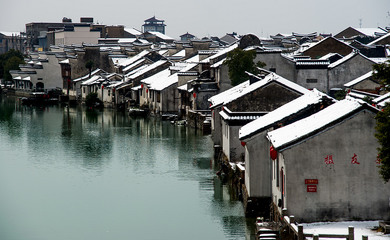24 Hours Hotline: +86 137-3541-1378
Email:[email protected]
24 Hours Hotline: +86 137-3541-1378
Email:[email protected]

It was raining cats and dogs when I reached the water town of Zhenze, after driving for more than an hour from downtown Suzhou.
Past the grand entry gate, there was a long pathway leading to the town center. Washed by rain, the trees along the pathway were exceptionally green.
Before coming here, I did some research on the town. It appears to date back about 4,000 years, and for a period of that history, it was famous for silkworms and silk products.
The name Zhenze first appeared during the Tang Dynasty (AD 618-907). It was the name of the mansion of a local official and was later applied to the town as a whole. For the next millennium, Zhenze reigned as an important place in the Yangtze River Delta region.
The town has largely escaped the commercial tourism overkill that blights many watertowns. Perfect for a visitor like me, who prefers to enjoy ancient buildings and relics in a more natural setting.
At the end of the entry pathway, a narrow river with a pagoda on the opposite bank greets the visitor. The Ciyun Temple is a Buddhist structure first built during the 13th century.
The bridge across the river dates back more than 300 years. Yuji Bridge was named to commemorate Yu the Great, a legendary Chinese deity who was said to control floods. The couplet carved on the bridge, however, was dedicated to two Qing Dynasty (1644-1911) emperors, Kangxi (1654-1722) and Qianlong (1711-99), praising their merits as comparable with Yu the Great.
Crossing the river to Ciyun Temple, the ticket seller at the admission booth told me, “Don’t climb the pagoda — it’s locked anyway. That’s the only real old thing here.”
The five-story, hexagon-shaped pagoda features delicately carved cornices. Silvery wind chimes drape down from the eaves. It was a pity there was no wind the day I was there. The bells would have no doubt created a pleasant musical backdrop to the temple.
Through the windows of the pagoda, I could see a wooden staircase winding up to the top, but the door was indeed locked.
With a structure more than 800 years old, even with some restorations, it’s understandable that the public is kept out for purposes of historical preservation.
Two peacocks roamed around the pagoda. In Buddhism, the peacock was sometimes used to represent the Buddha himself. Because the bird eats all types of venomous insects, it came to signify that Buddha could absorb all the pain and trouble of the earthly world.
Far from looking sacred, the peacocks I saw looked soggy and dispirited. They must have been wishing for a break in the rain as much as I was.
Inside the main temple is a tall statue of Guanyin, or the Goddess of Mercy. The statue, as well as the shrines around it, looked quite new. It turns out they were built just about a decade ago.
One of the shrines worships Zhao Gongming and Chen Jiugong, two legendary Taoist gods of treasure.
Outside the temple, the only main road in the town follows the Ditang River. Most of the small shops along the road were closed behind brown door planks, and the street looked forlorn in the pouring rain. The only bright color on the street were the red lanterns hanging overhead everywhere.
Shijian Hall was one local site open to visitors. It once belonged to a family surnamed Xu, the richest family in the town during the 19th century.
Xu Rufu (1838-75) rebuilt the hall from ruins and named it Shijian, meaning “learning to be thrifty.” It was a message to the family. No matter how rich they got, they should always remain humble and frugal.
The decoration of the hall and garden conveyed the admonition well. Compared with Xu’s family fortune, which was equal to half that of the town, the size and decoration of Shijian Hall is quite modest.
But modesty didn’t mean shabbiness. The owner must have loved the art of engraving because wood, brick and stone engravings in the hall are all exquisite and lifelike.
Inside the residence, a tiny garden called Chujing occupies no more than 240 square meters, but it includes all the classic elements of an ancient southern Chinese garden. The rockeries and pavilions give it the appearance of a three-dimensional painting. The refined design became a model for many subsequent modern gardens.
The scenery in the rain must look very different from it does bathed in sunshine. The garden on the day I was there looked pale, somewhat like an ink-wash painting. Since the area is prone to rainy days, the former owner must have enjoyed the scene much as I was seeing it that day.
Although the town was known for silkworm-raising and silk-making, which made some families prosperous, other residents preferred official careers.
Wenchang Tower, or the Tower of Cultural Prosperity, is a sign of that.
First built in 1771, the tower honored the god of academia, proffering blessings on young students sitting for the imperial examinations. The names of the people that performed well in the examinations are listed inside.
Today, the tower provides an excellent vantage point for visitors to survey the sweep of the town in the absence of Ciyun pagoda. I looked over the quiet, old, green town through a misty drizzle and couldn’t help but think of all the stories yet to be explored.
----From Shanghai Daily
Wechat: Chinaprivatetour
24 Hours Hotline:
+86 137-3541-1378
* Authentic Experiences: Genuine local experiences that immerse you in the true essence of Suzhou and beyond.
* Safety First: Highest safety standards with secure activities and reliable transportation.
* Customizable Tours: Flexible itineraries tailored to your interests and needs.
* Local Expertise: In-depth knowledge of Suzhou and China, offering exclusive insights.
* Professional Guides: Licensed bilingual guides with over 5 years of experience.
* Comfortable Travel: Experienced drivers and well-maintained vehicles for a smooth journey.
* Sustainable Tourism:Commitment to responsible tourism and supporting local communities.
* Customer-Focused: Personalized service and continuous improvement based on your feedback.
* Free Cancellation: Cancel up to 24 hours before travel for flexibility and peace of mind.
* 24/7 Support: Round-the-clock assistance for any questions or help needed.
1 to 1 tailor-made service from our professional travel advisors for the most sophisticated
Constantly excellent reviews for attraction, hotel and service Competitive price
Local experts provide quality tours Best selected knowledgeable local guides Authentic local restaurants
7*24 hours available to create you a worry-free tour. No Hidden Fees and absolutely no pressure to buy. Secured









Copyright © 2017 Suzhouprivatetour.com All rights reserved. 浙ICP备18056007号-4